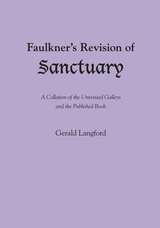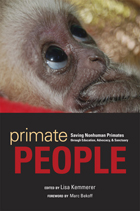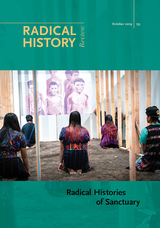

Was Sanctuary really a “cheap idea,” as Faulkner himself called it, a book “deliberately conceived to make money”? The question has teased the reading public since its publication. Many readers have had their worst suspicions about Faulkner’s work confirmed by his statement, but most serious critics have discounted the disparagement, emphasizing instead Faulkner’s further statement that when the galley proofs arrived from his publisher, “I saw that it was so terrible that there were two things to do: tear it up or rewrite it. I thought again, ‘It might sell; maybe 10,000 of them will buy it.’ So I tore the galleys down and rewrote the book.”
Now that two sets of the original galleys are available for inspection, one can see just how Faulkner reworked the novel. In the collation provided here by Gerald Langford, using Faulkner’s own corrected galleys held by the University of Texas at Austin, the reader can reconstruct the first version for himself, noting the cancellations, the additions, and the rewritten passages. As Gerald Langford makes clear in his introductory analysis, neither of Faulkner’s statements is to be trusted. Through revision, Sanctuary became theatrically more effective but thematically less interesting than the original version. Particularly noteworthy is the experimental narrative method of the original version, which foreshadows the method of Absalom, Absalom! as opposed to the straightforward, easily accessible method to which Faulkner turned in the revised Sanctuary and Light in August.


In the last 30 years the bushmeat trade has led to the slaughter of nearly 90 percent of West Africa’s bonobos, perhaps our closest relatives, and has recently driven Miss Waldron’s red colobus monkey to extinction. Earth was once rich with primates, but every species—except one—is now extinct or endangered because of one primate—Homo sapiens. How have our economic and cultural practices pushed our cousins toward destruction? Would we care more about their fate if we knew something of their individual lives and sufferings? Would we help them if we understood how our choices threaten their existence? This anthology helps to answer these questions.
The first section of Primate People introduces forces that threaten nonhuman primates, such as the entertainment and “pet” industries, the bushmeat trade, habitat destruction, and logging. The second section exposes the exploitation of primates in research facilities, including the painful memories of an undercover agent, and suggests models of more enlightened scientific methods. The final section tells the stories of those who lobby for change, educate communities, and tenderly care for our displaced cousins in sanctuaries.
Sometimes shocking and disturbing, sometimes poignant and encouraging, Primate People always draws the reader into the lives of nonhuman primates. Activists around the world reveal the antics and pleasures of monkeys, the tendencies and idiosyncrasies of chimpanzees, and the sufferings and fears of macaques. Charming, difficult, sensitive—these testimonies demonstrate that nonhuman primates and human beings are, indeed, closely related. Woven into the anthology’s lucid narratives are the stories of how we harm and create the conditions that endanger primates, and what we can and must do to prevent their ongoing suffering and fast-approaching extinction.

Contributors. Rachel Ida Buff, Caleb Duarte, Treva Ellison, Jason Ezell, Carla Hung, Kyle B. T. Lambelet, Sunaina Maira, Rachel McIntire, A. Naomi Paik, Jason Ruiz, Rebecca M. Schreiber, Aimee Villarreal, Elliot Young

Taking a Northern California community of migrants from Guatemala as a case study, Medina demonstrates the ways in which immigration policy and educational barriers exclude Indigenous migrant populations. He follows the community at the “Sanctuary”—a Spanish-speaking church in the East Bay Area that serves as a place of worship, English language instruction, and refuge for migrants. Medina assembles participant observations, interviews, surveys, and other data to provide points of entry into intersecting issues of immigration, violence, language, and property and to untangle aspects of citizenship, exclusion, and assumptions about literacy.
READERS
Browse our collection.
PUBLISHERS
See BiblioVault's publisher services.
STUDENT SERVICES
Files for college accessibility offices.
UChicago Accessibility Resources
home | accessibility | search | about | contact us
BiblioVault ® 2001 - 2025
The University of Chicago Press









